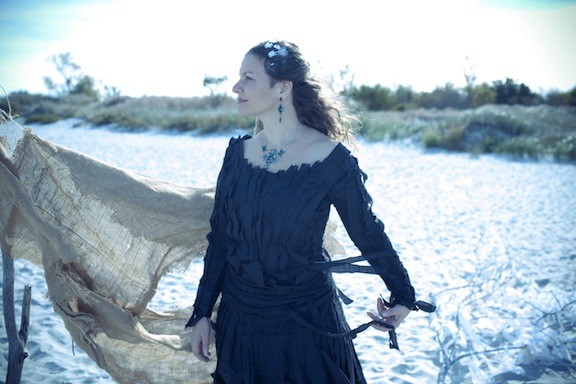Antje Duvekot
Evening Muse
March 22, 2014
"I've been traveling a lot lately," Antje Duvekot confided to the attentive Evening Muse audience as she adjusted a capo on her acoustic guitar. "It always seems like a miracle when people show up when I'm far from home."
Diffident, relaxed and luminous, Duvekot was awfully approachable for an artist often cast as a ethereal, troubled angel plummeting to earth. Lauded by the likes of rock critic Dave Marsh and the Boston Globe for her provocative dark-hued ballads, Duvekot is a forerunner of the current alt-folk singer-songwriter boom that's spawned acts like Hurray for the Riff Raff.
Yet on Saturday night, Duvekot was warm, friendly and funny, sharing down-to-earth stories about life on the road. Tales of a dispiriting tour of soggy old England, replete with bad food, bad weather and eerily unresponsive audiences, segued into the delicate, magical and defiant ballad "The Life of a Princess."
"The Long Way," a pulsing travelog defined by mournful harmonica and a guitar figure as insistent as raindrops pattering on a rooftop, was proceeded by Duvekot's recollection of an idealistic cross-country trek with her Communist companion, Sven, who lamented the Berlin Wall collapse.
A funny story about an intrusive landlady introduced the hilarious "Landlady Song" which had the audience laughing throughout the jaunty ditty. By then it was clear that Duvekot's set knew no rules, covering everything from pensive ruminations to a bouncy George Gershwin cover.
The set opener, a chiming cover of Dylan's "The Times They are A-Changin'," indicated there would be plenty of curves ahead. The only constant throughout Duvekot's set was her magnificent and supple voice. Ranging from an airy soprano to a dusky alto, Duvekot coupled Joni Mitchell's phrasing with Judy Collins' clarity, mixing grit and stratospheric flights in a single verse. A catch in her upper register invoked The Cranberries' Delores O'Riordan's Celtic lilt.
That voice was the perfect instrument to convey the vivid and dreamlike quality of Duvekot's originals, songs that evoked the magic we each encounter everyday - like the signal tower standing sentinel in the middle of a desert in "Lighthouse" - and transform it into timeless poetry that is both detail specific and universal.
Duvekot's catchy, captivating songs employed a deft sleight-of-hand, managing to seem simpler than they were. Indeed, the tunes were so complex, that Duvekot couldn't play them on the ukulele. Joking that her tenor ukulele looked like her guitar just had a baby, Duvekot admitted her skill was confined to just three chords on the four stringed instrument.
Those three chords were plenty for a jumping, snappy cover of Jason Mraz's "I'm Yours," a shimmering, silvery-toned run-through of Jackson Browne's "Doctor My Eyes" and a stripped down and tremulous take on Billy Bragg and Wilco's posthumous collaboration with Woody Guthrie, "Aginst Th' Law."
Yet it was Duvekot's originals that rightly claimed the spotlight. Introduced as a song about her ex - a literal-minded guy who thought "Lighthouse" was about global warming - the narcotic tone poem "Sleepy Sea of Indigo and Blue" boasted a gently flowing guitar figure and an arching, full bodied vocal that recalled the power of Joan Baez. Calling it a song she didn't care for until an ad agency offered her a lot of money for licensing, set-closer "Merry Go Round" was percussive, stomping and playful as Duvekot's rapid-fire wordplay reeled off pointillist modern-life portraits.
Encore "Anna" was a sweet serenade to Duvekot's grandmother; whose last years were lost in a mist of Alzheimer's and jazz-age memories. Though the tune weaved tendrils of reverie, Duvekot wasn't about to leave the audience in a poof of pensive pixie dust. She prefaced the song with a typically quirky and engaging story: Asked to play "Anna" at a medical convention, Duvekot went onstage before Ozzy Osborne.
"Ozzie wasn't playing at the convention," Duvekot explained. "The doctors had isolated his genome because they wanted to study him. They wanted to know how he had survived all those drugs."
If you needed proof that we lived in a strange and changing world, there it was - Antje Duvekot "opening" for Ozzy Osborne.

